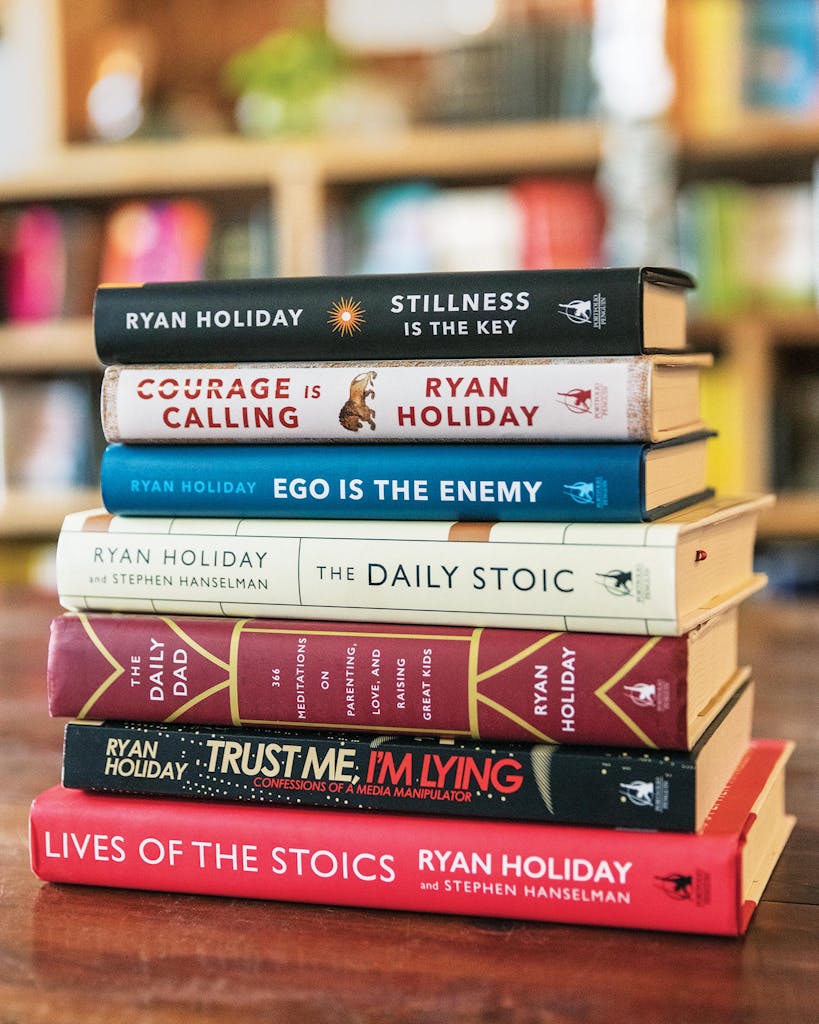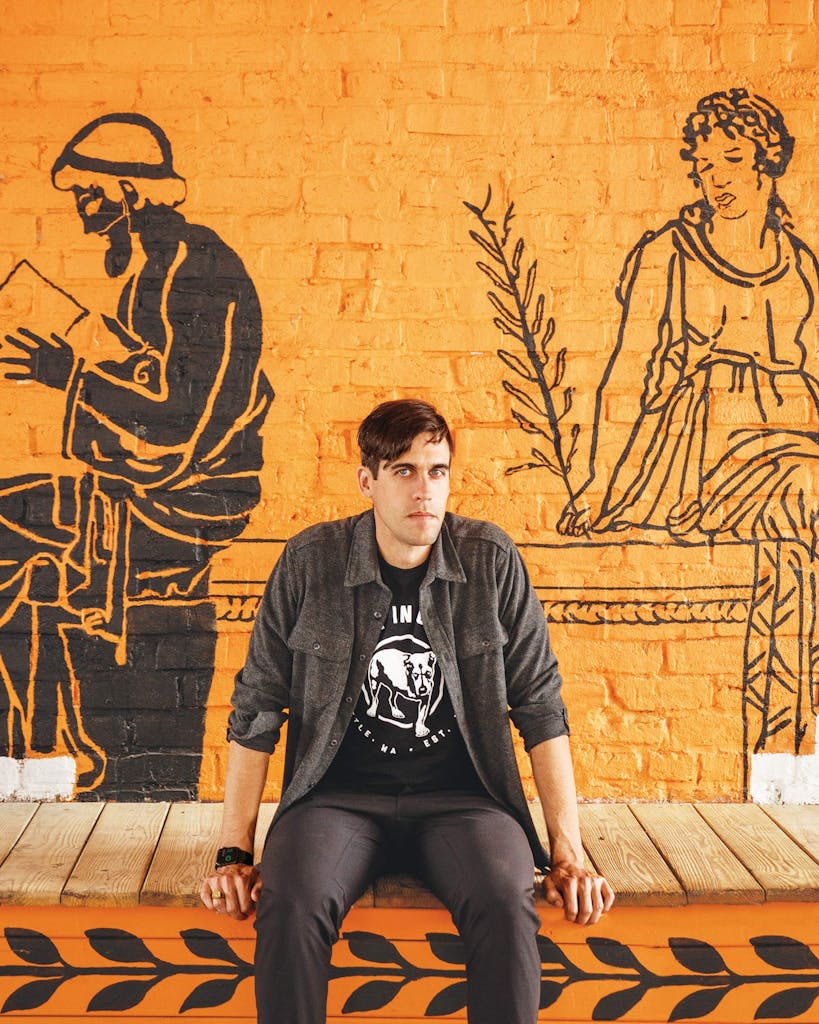The couple staking out the Painted Porch Bookshop on a gloomy February morning are out of luck. They appear to have come to Bastrop, about thirty miles southeast of Austin, expressly to meet its owner, the best-selling author Ryan Holiday. As soon as he steps through the store’s front door onto the sidewalk, the man and woman burst out of Maxine’s Cafe across the street and charge toward him. When he doesn’t acknowledge them, they slow their approach like dogs that have just registered the subaudible hum of an electric fence.
Holiday doesn’t stick out in Bastrop just because it’s a small town of fewer than 10,000 residents—a mix of longtime locals and off-duty celebrities such as actor Adrian Grenier and deejay Paul Oakenfold. He is instantly recognizable by virtue of his distinctive look. He keeps his dark brown hair tight and tall, adding height to his already Lincoln-long face. His overall appearance, from his slender build to his prominent brow, evokes a Tim Burton character. Today he wears a Bon Iver T-shirt, a black nylon jacket, and black joggers.
Holiday first made his name more than a decade ago as a marketing wunderkind and then mined that experience to produce the best-selling exposé Trust Me, I’m Lying: Confessions of a Media Manipulator. But he soon trained his focus on Stoicism, the ancient school of philosophy that has informed his other massively successful books, including 2014’s The Obstacle Is the Way: The Timeless Art of Turning Trials Into Triumph and 2016’s The Daily Stoic: 366 Meditations on Wisdom, Perseverance, and the Art of Living. (He did not fully decamp from his perch as an observer and critic of the media. In 2018 he published Conspiracy: Peter Thiel, Hulk Hogan, Gawker, and the Anatomy of Intrigue.) Holiday is now the locus of a constellation of franchises that churns out books, podcasts, and newsletters and has attracted a large, devout audience, one that has ballooned further since the pandemic: in 2020 one of his four Instagram accounts, @dailystoic, doubled its followers to more than two million. The judgmental alabaster faces of the early Stoics peer out at us from every social media platform.

Holiday’s Stoicism revolves, in part, around the idea that we have tremendous agency in sculpting our reactions to the world around us. In The Obstacle Is the Way, which was famously popular among the New England Patriots ahead of their 2015 Super Bowl victory, he directs us to focus on the “poorly wrapped and initially repulsive present you’ve been handed in every seemingly disadvantageous situation.” Reading his books, one feels that one has a greater capacity for rational action than when one’s index finger is quivering with the urge to press “send” on an ill-advised, passive-aggressive email. (From The Daily Stoic: “Today, don’t try to impose your will on the world. Instead see yourself as fortunate to receive and respond to the will in the world.”)
From Marcus Aurelius, Epictetus, Seneca the Younger, and beyond, Holiday draws all manner of wisdom, and he confidently pulls out threads of Stoicism from the works and lives of others. His distillation of the philosophy into easily digested pellets has been criticized by some as an oversimplification. In a recent essay for Harper’s about Marcus Aurelius, Tom Bissell counted Holiday among a cadre of “seemingly sincere promoters of Stoicism who seemed to miss entirely the point of Stoic thought.” He found Holiday’s neo-Stoicism too prescriptive, where the paleo-Stoics were more diagnostic. Bissell felt that Stoicism didn’t lend itself to self-help as readily as it has appeared to in Holiday’s hands. But Holiday sees his books as avenues into philosophy for those who might not otherwise seek it out. “How do you take something that people actually need and would like but think that they don’t?” he says. “People don’t wake up and go, ‘I really need philosophy.’ But they do wake up and say, ‘I have a problem, and I need help.’ ”
His latest title, The Daily Dad: 366 Meditations on Parenting, Love, and Raising Great Kids, which was published in May and is his thirteenth book, is less Stoic-centric and more of a Chicken Soup for the Frightened Parent’s Soul, quoting figures such as George Orwell and building lessons from modern parables. There is just enough Stoicism for the philosophy daddy. The installment for January 19, for instance, begins with a quote from Seneca: “Without a ruler to do it against, you can’t make crooked straight.” Translation: just as leaders should set a good example for their people by living honorably, so should parents set a good example for their children by not having a squalling breakdown in the self-checkout line at Target.

By virtue of the daily format of some of his titles and the infrastructure around them—social media, podcasts, and YouTube channels—many of his fans engage with his content every day, as one might with a religious leader. Pilgrims to the Painted Porch, which he and his wife, Samantha, opened in 2021, are now a common sight. Outside the store, the couple who came flying out of Maxine’s loiter uncomfortably as Holiday stands there, waiting for him to stop talking to me long enough for them to cut in. Instead he filibusters. He explains how he and Samantha came to own the building, which is one of the quaintest on Bastrop’s extraquaint main drag. They themselves had been having breakfast at Maxine’s in fall 2019 when they noticed that 912 Main was for sale. Since the pair moved to a forty-acre Bastrop ranch in 2015, they had been commuting to Austin, where they had an office. Holiday, who produces a long-standing newsletter in which he recommends books, was enchanted by the idea of owning a bookstore. The building also houses Astro Record Store and a former barbershop.
The two fans grow more ostentatious. The woman begins taking photos of the shop’s front door. “I wanted to get a photo for Tim,” the man tells her loudly, gesturing at Holiday. Only when they give up (sorry, Tim) and walk into the bookstore does their target seem to relax. He is “a textbook introvert,” Samantha later confirms. He recognizes that opening a store is an unusual choice for someone who enjoys quiet contemplation of ancient works. But his introversion seems to arise less from social anxiety than from a sensitivity to invasions upon his time, however well-meaning. “I would like to say hi to everyone, but if I say hi to everyone, I’ll never get any work done.”
Right now, he’s focused on giving me the full tour. “I’ll show you the record store,” Holiday says once the couple is occupied inside. We sweep through the vinyl shop and say hello to its owner, Kevin Mawby, before returning to the Painted Porch.
Holiday’s work has its own section near the front of the store, just past the philosophy and self-help shelves. “Now that I think about it,” he says, “mine should be in the middle,” pointing out that his oeuvre straddles the two genres. Distributors generally categorize his titles as “business” or just as best-sellers—his books have reportedly sold more than six million copies.
The shop is easily navigable, with the shelves curated to Holiday’s liking. While he carries some recent releases, older titles figure prominently. The philosophy section, for instance, gives Stephen Greenblatt’s The Swerve: How the World Became Modern (2011) pride of place next to Viktor Frankl’s Yes to Life: In Spite of Everything (1946). “My experience in publishing has been that the vast majority of new books don’t sell at all, and what they call the backlist titles do all the heavy lifting,” Holiday says. The Obstacle Is the Way, for instance, hit the top spot on the Wall Street Journal best-seller list in 2019, five years after its initial publication. “This is more of what you would call a backlist bookstore.”
The Painted Porch’s decor also mirrors his sensibilities. In the middle of the shop, a two-story fireplace surround has been constructed out of glued-together books. A mezzanine, accessible from the offices above, is bisected by a tree from Holiday’s ranch that fell during the 2021 freeze. To the left of the trunk is a rack of T-shirts, including a yellow one with a “Don’t Tread on Me” print in which the snake makes the shape of a uterus and fallopian tubes. We walk through the children’s section and check out the vast back porch, where he prefers to work when the weather cooperates. “People will just walk by and say hi, and it takes two seconds, which is nice.”
Next to the porch is an alley leading to a back room he’s outfitting to be his new podcast studio. He shows me what will be the centerpiece of the space: the still-wrapped-up table and chairs where he will record his interviews. The furniture once belonged to Joan Didion; he was one of the winning bidders in the estate sale of the writer’s personal effects last November. He had initially pined for her desk, which ultimately went for $60,000, but is boyishly excited about his consolation dining set, which he bought for $9,500. (He also bought her elegant swiveling desk chair for $14,000; I sit in it briefly, savoring my communion with her tushy.) Holiday, like Didion, is from Sacramento, California, and he appreciates the table as a reminder of where he’s from and “where it’s possible to go.”
Trust Me, I’m Lying established Holiday as
a writer, setting him up to delve into his interest in Stoicism, which had been simmering since he first encountered Marcus Aurelius, in college.
Next he introduces his content team, a group of mostly twentysomethings who are crowded around a table in a second-floor office (they, like their boss, prefer the porch on nicer days). When he finally sits down, in a low, mid-century modern leather chair in his own office, he appears unsure how to do it. He leans forward on the seat, then slouches, stretching his neck over the seat back so that he’s looking up at the ceiling.
Holiday, who turned 36 in June, is a decade older than some of his employees, but his energy and ambition make him seem younger. He attributes his early success in part to being “an internet kid,” innately savvy about subject matter that intimidated his elders. But there were a lot of internet kids, and most of them didn’t rise to run the marketing department of a publicly traded company in their early twenties. And none went on to build a multiplatform self-help empire—one that feels current, even though it’s built on ancient ideals. Is his success a testament to the enduring power of Stoic teachings or to a marketing genius’s well-documented gift for branding?
Holiday was a child of MySpace and of the website builder Homestead, where he created hella snowboarding sites. Growing up he spent long hours alone, learning to navigate the internet’s currents. “I think I went in my room because I wanted to figure stuff out, and the internet was a world where no one knew how old you are, where you’re from,” he says. Those hours spent being immersed in prototypical social media and blogs did help him stand out in 2008 when he, at age 21, began to work in marketing at American Apparel, at the time one of the fastest-growing businesses in the nation.
At the same age I was when I missed a week of an internship because I got a concussion after a few too many Fireball shots, he was a director of marketing. A few years later he left his post but continued working with American Apparel as an adviser. His first book, 2012’s Trust Me, I’m Lying, was a scathing study of American media—how it was broken and how to exploit the cracks—and was followed by another marketing book. Though his career in media strategy had spanned just four years, he felt profoundly exhausted by it. “I’d been deposed for multiple lawsuits,” Holiday says. “I felt very, very old.” He had little concern for the bridges he was burning in writing the book; he wanted out. Trust Me, I’m Lying established Holiday as a writer, setting him up to delve into his interest in Stoicism, which had been simmering since he first encountered Marcus Aurelius, in college. He published The Obstacle Is the Way in 2014, followed by Ego Is the Enemy two years later.
Holiday’s agent, Stephen Hanselman, recommended that he write his next book, which would deal more directly with Stoicism, in installments meant to be read daily. Holiday concedes that he didn’t initially see the appeal, but the concept had worked for management expert Peter Drucker, author of The Daily Drucker, Hanselman told him. (Holiday also notes that Tolstoy wrote a compilation of his favorite quotes that was meant to be read daily.) “He was like, ‘This will be your best-selling book,’ and I was like, ‘That can’t possibly be true,’ ” he recalls. “But he’s more or less been correct.” The Daily Stoic was easy to translate into a blog, which Holiday did in 2016, and then into a podcast and newsletter.


He and Samantha had been moving with some regularity, first from Los Angeles to New Orleans, in 2011. When he published his first book, they relocated to New York because he thought that was simply what writers did. He despised the noise of the city, however, and they soon headed to Austin, which struck them as a blend of L.A. and New Orleans, and then to Bastrop. “At some point we were like, ‘If we’re gonna live in Texas, let’s live in Texas,’ ” he recalls. The town’s rurality felt like a natural progression for him: as his profile was growing, so were the demands on his time, and he felt better protected from those pressures out of the city. “Each step has been a step away from whatever the scene is.”
Of course, Bastrop has since become its own scene, partly because of the celebrities and pseudo-celebrities who’ve relocated there. (Incidentally, Grenier, of Entourage fame, lives near Samantha’s parents, who settled in Bastrop during the pandemic.) “I think the people that have moved out here have moved out here also to be chill,” Holiday says. “I don’t think anyone is trying to make Bastrop happen. It’s just kind of happening.”
Bastrop has done little to chill out Holiday, who has had several ferociously productive years here. In addition to The Daily Dad, his two most recent works, 2021’s Courage Is Calling: Fortune Favors the Brave and last year’s Discipline Is Destiny: The Power of Self-Control, are part of a four-book series on the cardinal virtues. The next one, on justice, comes out next year.
Holiday doesn’t claim to live every second of his life according to Stoic principles. He sees himself as a Stoic aspirant (“I like to say one of us is a Stoic, and one of us writes about Stoicism,” Samantha quips) who badly wants to touch the ideals he espouses. On his arms, he’s tattooed the titles of several of his virtue-based books. On his right inner wrist next to his Apple Watch—on which he counts calories and miles from running, biking, and swimming—“stillness is the key” peeks out in a bold black font.
In drawing heavily on the work and lives of others, Holiday is an outlier in the self-help realm, where trading in personal experience and making oneself seem like the reader’s wizened-but-accessible pal is the norm. He is more like your pal who, when you’re venting about your boss, might reply with the story of a dynastic struggle in ancient Rome.
He has always been this way, his wife says. She met Holiday at a house party—“I think we used to call them kickbacks”—while both were in college at the University of California, Riverside. (He dropped out; she graduated.) “He was talking to some friends about The 48 Laws of Power, and I was like, ‘Who are you? What is this?’ ” she recalls. That Holiday was holding court on a book for “anyone interested in gaining, observing, or defending against ultimate control” at age nineteen was not a red flag for Samantha. “It was a caliber of conversation that I wasn’t typically having, and he was just casually getting into a debate about this thing.” (The author of 48 Laws, Robert Greene, was Holiday’s mentor and pointed the young man to American Apparel, where he was on the board.)

Holiday doesn’t dabble in the trivial. Most current self-help stars cater to those hoping to give less of a f—, and while Holiday does acknowledge everyday stressors, he seems to be geared more to those who are lusting after greatness rather than contentment.
I spoke with one of his longtime friends, Brent Underwood, who works with him at Brass Check, a consulting firm Holiday founded in 2012 and named after Upton Sinclair’s own media tell-all. “I think we were both looking for a less traditional path, and we both get excited about fun ideas,” Underwood said. Brass Check specializes in advising media companies, start-ups, and authors—Tim Ferriss, Tony Robbins, and Neil Strauss among them.
In the spring of 2020, Underwood made headlines when he began living alone in an abandoned California mining town, Cerro Gordo, that he had purchased in 2018. When Holiday began to consider opening the Painted Porch, Underwood pointed out that bookstores were a lot of work but cheered him on, just as Holiday had encouraged Underwood when he was considering buying a ghost town. (Holiday is an investor in Cerro Gordo.) “Ryan’s the most supportive mentor-type figure that I’ve had in my life, as far as crazy ideas.”
This is the Holiday effect. When daily concerns are not just minimized but converted into fuel, as they are in The Obstacle Is the Way, there is nothing immovable between you and buying a ghost town in California. Or opening a bookstore in Bastrop.
Holiday will say his philosophy, built on the recycled insights of Stoics and other great thinkers of the past, is based in timeless and universal truths: recognize that you can control your perception of a situation; act ethically; death is coming for you, so don’t waste your days on Instagram. But it is also uniquely well tailored to the pandemic era, when so many Americans began to see their jobs as trivial and expendable that there was a Great Resignation. Holiday is an excellent prophet for a decade in which sustaining oneself by encasing one’s naked body in Jell-O for Medici-like patrons on OnlyFans seems ever more appealing.
He has also tapped into a national preoccupation with attention management and the devices that threaten it (see also: Johann Hari’s Stolen Focus: Why You Can’t Pay Attention). Guarding one’s bandwidth is one of the values he espouses in his books and beyond, to the point that many regard him as a productivity guru. But Holiday is clear that he does not live an overly regimented life. He writes his Daily Stoic newsletter in batches, not every day, and he employs researchers too. The day of my visit, he tells me, he dropped his kids off at school and came to the store, where he wrote for an hour before I arrived. When I leave, he says, he’ll eat lunch, work a little more, go for a run and then to an after-school event. He’s rarely at the store past 5 p.m. and is in bed by 10 or 11 p.m.
“In the regimen, there’s freedom,” he says. He has things he does every day, and because he does them daily he is relatively immune to distraction and procrastination. “It’s regimented in the sense that it’s consistent, but it’s not regimented in the sense that I’m working twenty-hour days and I don’t get to do what I want,” he says of his routine. “I think people waste a lot of time and then think that that’s freedom.”


Several weeks after our first meeting, Holiday invites me back to visit Didion’s now-unwrapped table and chairs. I return on the first mid-eighties afternoon of a premature spring, as the leaves on the trees are on the cusp of popping. In the sun, Bastrop’s Main Street has transcended its prior quaintness and evokes the town in Gilmore Girls, with just as many improbably L.A.-looking people sashaying around. Holiday greets me in a black Metallica T-shirt from 2009, with the Austin-based writer Philipp Meyer, in a light blue button-up, in tow. They’ve just recorded a Daily Stoic podcast episode at “the Table.”
Holiday contacted Meyer after reading the author’s 2013 novel The Son, the story of a family in Texas told over three centuries. A finalist for the Pulitzer Prize, it’s featured prominently on a shelf of Texas literature behind the register. They began by discussing the table. (“What?” Meyer said, leaning on it carefully before obliquely asking how much it cost. “Too much,” Holiday replied.) Then they launched into a dissection of writing, failure, ego, and the American West.
The recording room was a work in progress during my last visit. Now the walls are fully covered with books, and a big, moonlike light hangs in one corner. Didion’s table stands in the middle of the room. When it was still covered up, Holiday had fretted that it was too short, and I did wonder if he had accidentally purchased a children’s table. It doesn’t look so petite now, though it is clearly ideal for a small woman. (Didion was five feet tall.) It’s charming to think of a rotation of guests having big discussions at this unimposing piece of furniture.
Holiday’s enthusiasm for tactile reminders of people and ideas lends itself to merchandise. In addition to pendants, prints, and journals, the Daily Stoic store sells medallions with Stoic reminders. On the front of the most popular coin is a skull, abutted by an hourglass and a flame, emblazoned with the Latin “Memento Mori” (“Remember that you will die”). The flip side reads: “You could leave life right now.”
The high cost of the swag may cause cynicism to flare, and I had noticed some skepticism about the products he sells, particularly among Stoicism purists on Reddit. The full medallion bundle sells for $257. The online store also offers a $400 pewter bust of Marcus Aurelius on a cherrywood base.
But Holiday’s zeal for concrete reminders of ideals, at least, does feel authentic, in the sense that he collects these things personally. He owns his own bust of Marcus Aurelius, and when I call Hristo Vassilev, who previously worked as a researcher for Holiday, he tells me he’s staring at a Marcus Aurelius bust that Holiday had given him years ago.
Embracing an ancient code does not, for Holiday, mean eschewing the conditions and politics of the day.
Even the most critical Sto-bros of Reddit do sometimes concede that Holiday’s books are good “gateways” and “primers” for those of us unfamiliar with Stoicism. I, for instance, knew nothing about the Stoics before I began listening to The Daily Stoic podcast last year; men I knew kept alluding to it, and I wanted to see what it was about. Holiday says that while his audience might appear gender-skewed on some platforms, the assumption that Stoicism is appealing mostly to men is a long-standing stereotype. In the introduction to The Daily Dad, he writes that thousands of women receive the Daily Dad newsletter and adds, “It’s called the Daily Dad because I happen to be a father—of two boys—and that’s about all you need to read into the name.”
I ask Vassilev why readers and listeners seem to be connecting so intensely with Stoicism right now. “I think everyone living throughout history would say that it’s always the craziest possible time,” he says. “But I think we all have a sense that the last three years—in terms of the pandemic and inflation and the war in Ukraine—there’s quite a lot of turbulence. I think Stoicism can help just with personal agency, just as a reminder of what you can control and what you cannot.”
The pandemic jarred Holiday’s interpretation of the Stoics. During one of our conversations he brings up a different pandemic, the Antonine Plague, which devastated the Roman Empire from 165–180 AD, during Marcus Aurelius’s co-rule of Rome. “Let’s say I’m reading Marcus Aurelius in 2008, and in one of his passages he says there’s a plague that can take your life. Then he’s like, ‘And there’s a plague that can take your character,’ ” he says, paraphrasing a line from Meditations. (“Diseases like that can only threaten your life,” reads the Gregory Hays translation of the text. “This one attacks your humanity.”)
In 2008 Holiday might have assumed Marcus Aurelius was being figurative. But once he himself was mired in a worldwide plague, he saw that Marcus Aurelius was being both figurative and literal. “Of course, twenty centuries ago, some people were like, F— you, who are you to tell me what to do? Or, It’s not real,” he says, alluding to anti-maskers and COVID-19 denial. “Superstitions. It would have been the exact same. Or just people simply breaking from the stress and strain of it.” Holiday says he has approached the Stoics totally differently since 2020.
“What’s brilliant about Marcus, specifically,” he continues, “is that he’s just kind of vague and poetic enough that, not unlike the parables that Jesus talks about, you can see what you need to see in a given moment.”
His interpretations do estrange some would-be Stoics. In early March 2021, Holiday lambasted Governor Greg Abbott on Twitter for ending the state’s mask mandate. Some of his respondents sought to turn his ideals against him. “I would never suggest you stay in your lane,” one man wrote, “but I do think your tone and words contradict how you recommend people show up in the world.” “You sound a little upset there, Ryan,” wrote another user. “I think that goes against your religion. Also you can’t control what the governor does so you might as well let it go.”
Embracing an ancient code does not, for Holiday, mean eschewing the conditions and politics of the day. He has also been heavily involved in an effort to remove a Confederate statue from in front of Bastrop’s courthouse, and he has acquired some frightening detractors since he and Samantha hosted a drag story hour at the Painted Porch.
“There is a version of Stoicism,” Holiday says, “that I think very fragile people are attracted to. Because Stoicism says: focus only on what you can control; other people’s feelings are not something you control. But I don’t think Marcus Aurelius was saying ‘Be an asshole because other people’s feelings are not your problem.’ I think he was saying ‘If other people don’t like you, that’s their problem, but you should still try to be kind and respectful.’ ”
Holiday suggests that we are experiencing an endemic void of moral guidance, comparable to the void he sees in the long era that followed the 27 BC fall of the Roman Republic, when polytheism had defined social order, leading up to Marcus Aurelius’s tenure as emperor. “There was this moment where there wasn’t a church telling people how to live, but there was kind of a code of living that was mostly rooted in philosophy, and I think people are going, ‘Well, okay, what are my obligations to other people? Where does happiness come from? How do you deal with adversity?’ These might be questions that you might have heard addressed in church or in your Masonic temple,” he says, scoffing a little at his own example. “Or even just: you would have grown up living with your grandmother and grandfather in your house. That lack of generational wisdom leaves a really big blank spot.”
I ask Holiday whether that type of churchy and generational wisdom hasn’t been replaced by all the moralizing done on social media and even, often, by the news media. What is Reddit’s “AmItheAsshole” group—where users can gut-check their actions anonymously before a jury of eight million peers—if not a proxy for the confessional, with millions of readers sitting behind the screen? “I think that stuff is very political, or very cultural,” he says, and it doesn’t answer the question he poses in his work: Okay, what am I supposed to build my life around? “To me, that’s what philosophy is about. Like, the guide to the good life,” he says. Is he, at 36 years old, going to craft a whole new explanation of what that life looks like? “I don’t know. That seems preposterous and presumptuous to me.”
But preposterous and presumptuous has been the Ryan Holiday way, and it’s worked out for him so far.
This article originally appeared in the July 2023 issue of Texas Monthly with the headline “The Stoic King of Bastrop Country.” Subscribe today.









